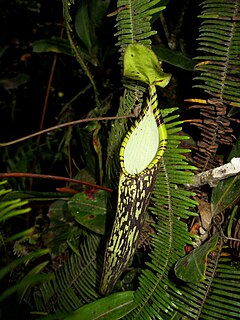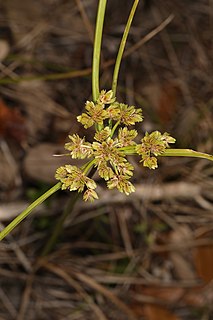
Cyperus papyrus, better known by the common names papyrus, papyrus sedge, paper reed, Indian matting plant, or Nile grass, is a species of aquatic flowering plant belonging to the sedge family Cyperaceae. It is a tender herbaceous perennial, native to Africa, and forms tall stands of reed-like swamp vegetation in shallow water.

Rubus spectabilis, the salmonberry, is a species of bramble in the rose family Rosaceae, native to the west coast of North America from west-central Alaska to California, inland as far as Idaho. Like many other species in the genus Rubus, the salmonberry plant bears edible fruit, typically yellow-orange or red in color, resembling raspberries in appearance.

Cyperus is a large genus of about 700 species of sedges, distributed throughout all continents in both tropical and temperate regions.

Nepenthes spectabilis is a tropical pitcher plant endemic to Sumatra, where it grows at elevations of between 1400 and 2200 m above sea level. The specific epithet spectabilis is Latin for "visible" or "notable".

The banner-tailed kangaroo rat is a species of rodent in the family Heteromyidae. It is found in arid environments in the southwestern United States and Mexico where it lives in a burrow by day and forages for seeds and plant matter by night.

Cyperus surinamensis, also known as the tropical flatsedge, is a sedge of the family Cyperaceae that is native to the Americas.
Cyperus prolixus is a species of sedge that is native to southern parts of North America, Central America and tropical parts of South America.
Cyperus seslerioides is a species of sedge that is native to southern parts of North America, Central America and parts of South America.

Cyperus entrerianus, commonly known as the woodrush flatsedge, is a species of sedge that is native to southern parts of North America, Central America, and parts of South America.
Cyperus croceus, commonly known as Baldwin's flatsedge, is a species of sedge that is native to parts of North America, Central America, and South America.
Cyperus drummondii, commonly known as Drummond's sedge,is a species of sedge that is native to the southern parts of North America, parts of Central America, and northern parts of South America.

Cyperus hermaphroditus, commonly known as the hermaphrodite flatsedge, is a species of sedge that is native to parts of southern parts of North America, Central America and northern parts of South America.

Cyperus houghtonii, commonly known as Houghton's flatsedge, is a species of sedge that is native to parts of North America.

Cyperus ligularis is a species of sedge that is native to southern parts of North America, Central America and northern parts of South America] as well as along the east coast of Africa.
Cyperus mutisii is a species of sedge that is native to parts of southern parts of North America, throughout Central America and in northern parts of South America.
Cyperus pallidicolor, commonly known as the pallid flatsedge, is a species of sedge that is native to southern parts of North America, parts of Central America and northern parts of South America.
Cyperus planifolius, commonly known as flatleaf flatsedge, is a species of sedge that is native to southern parts of North America, Central America, the Caribbean, and northern parts of South America.
Cyperus schomburgkianus is a species of sedge that is native to parts of South America.
Cyperus schweinitzii is a species of sedge that is native to parts of North America.









